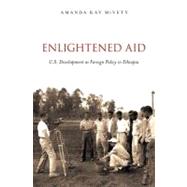Enlightened Aid U.S. Development as Foreign Policy in Ethiopia
, by McVety, Amanda Kay- ISBN: 9780199796915 | 0199796912
- Cover: Hardcover
- Copyright: 3/30/2012
Enlightened Aidis a unique history of foreign aid. It begins with the modern concept of progress in the Scottish Enlightenment, follows its development in nineteenth and early twentieth-century economics and anthropology, describes its transformation from a concept into a tool of foreign policy, and ends with the current debate about aid's utility. In his 1949 inaugural address, Harry Truman vowed to make the development of the underdeveloped world a central part of the United States government's national security agenda. This commitment became policy the following year with the creation of Point Four-America's first aid program to the developing world. Point Four technicians shared technology, know-how, and capital with thirty-four nations around the world. They taught classes on public health and irrigation, distributed chickens and vaccines, and helped build schools and water treatment facilities. They did all of it in the name of development, believing that economic progress would lead to social and political progress, which, in turn, would ensure that Point Four recipient nations would become prosperous democratic participants in the global community of nations. Point Four was a weapon in the fight against poverty, but it was also a weapon in the fight against the Soviet Union. Eisenhower reluctantly embraced it and Kennedy made it a central part of his international policy agenda, turning Truman's program into the United States Agency for International Development. Point Four had proven itself to be a useful tool of diplomacy, and subsequent administrations claimed it for themselves. None seemed overly worried that it had not also proven itself to be a particularly useful tool of development. Using Ethiopia as a case study,Enlightened Aid: U.S. Development as Foreign Policy in Ethiopiaexamines the struggle between foreign aid-for-diplomacy and foreign aid-for-development. Point Four's creators believed that aid could be both at the same time. The history of U.S. aid to Ethiopia suggests otherwise.







